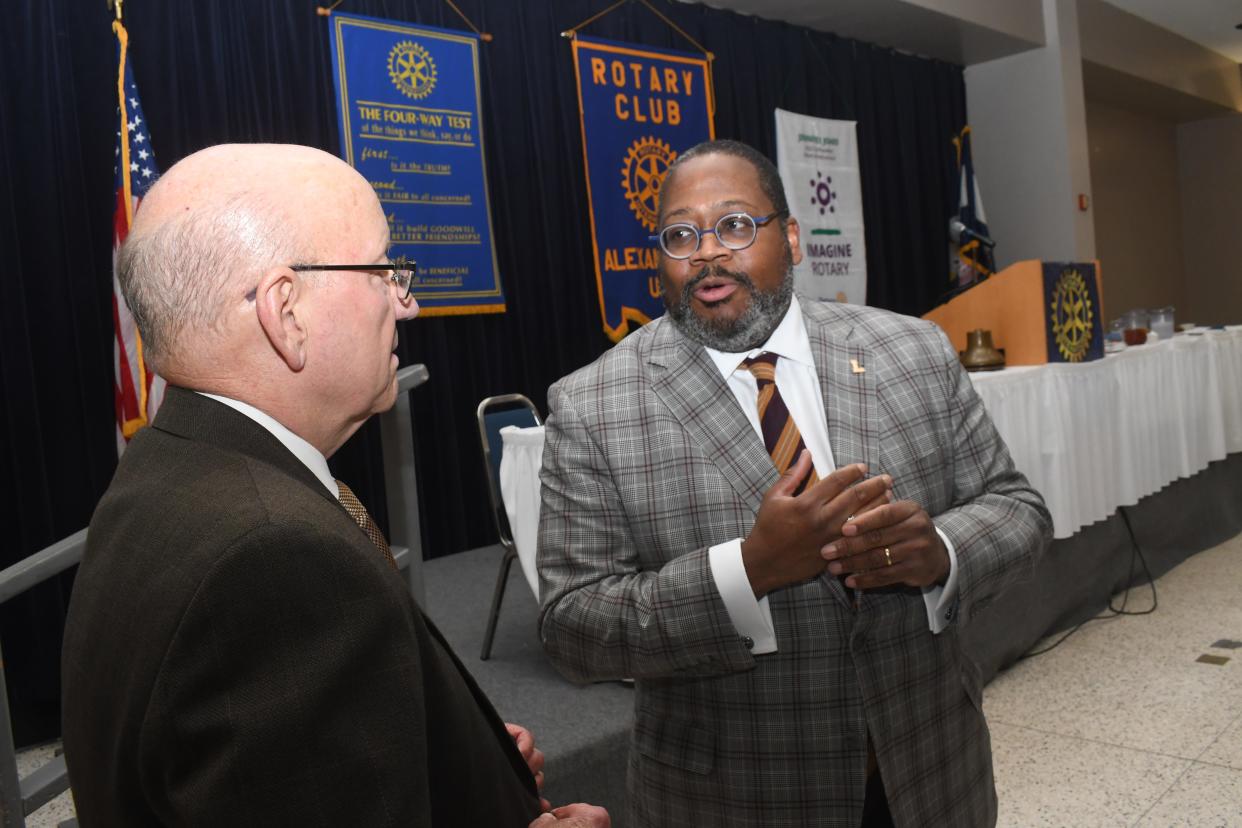Loyola president tells Alexandria Rotarians that education impacts businesses, communities

Declining enrollments and questions around access to affordability have many questioning whether a higher education degree is actually worth it.
“I’m her to say emphatically that yes, it is,” said Dr. Xavier Cole, who stepped into the role of president of Loyola University New Orleans, a Jesuit institute of higher learning, six months ago.
He is the first person of color and the second layperson to serve as president since Loyola New Orleans’ founding in 1912.
Making his first visit to Alexandria, Cole was the guest speaker at the Rotary Club of Alexandria’s weekly luncheon.
“Education is deeply important,” Cole told Rotarians. “And we’re going to talk about that a bit today. What that means, particularly for those of you who are businesspersons and entrepreneurs. Our role in higher education is to educate, humanize and foster meaningful connections among a diverse group of people.”
He said they seek to create servant leaders with deep sense of service to their communities.
“We seek to support social justice informed by faith, which shows up as a preferential option for the poor. We intentionally develop the mind, body and spirit of others in service to God,” said Cole. “We are intentionally creating these countercultural opportunities to combat the crush of technology by the encouraging the development of an interior life among our students, our faculty and our staff to combat the more negative aspects of information bombardment of our handheld technologies.”
Loyola New Orleans’ student population is over 30 percent first generation and of that, over 50 percent is diverse, he said. So, they are educating an increasingly diverse demographic.
He said the work they engage in in higher education is about positively engaging young people in ways that help them believe that they can be difference makers in their communities.
“Intellectually, we are creating liberal learners, that is to be liberally educated to think critically, speak eloquently, to act with purpose, always with the greater needs of the community in mind, with care for the person at the center of all they do,” said Cole.
For business leaders and entrepreneurs in Alexandria, that means Loyola New Orleans is preparing their future workforce to be not just academically prepared, but spiritually and ethically prepared to be servant leaders who show up at their companies and communities as forces for good.
He said their law school is a standout. After Hurricane Katrina in 2005, their law clinic was instrumental in being a voice for the voiceless.
“And help them fight large companies to get the settlements that they needed to move forward. And to remain in Louisiana. It was because others were not successful that they left this state,” said Cole, leading to a “brain drain.”
“But Loyola was on the ground leading the way pro bono to make sure that this community could get the justice they deserved,” he said.
They also engage in community service with kindergarten through 12th grades. Early positive mentoring, coupled with food security programs and connections to mental health supports, will yield stronger children who will be ready to learn, he said. This will help them grow into young adults wanting to learn and possibly be mentors themselves.
“I know Rotarians are also investing in the space of early childhood education, knowing that this is an investment in all our futures,” said Cole.
He challenged business leaders experiencing workforce challenges to not only think about university graduates who are “narrowly trained” in one discipline or job, but to think about humanities majors who will be trained to perform in almost every setting.
“Because they come from excellent reading, writing, research, communication, interpersonal, critical and creative thinking skills,” said Cole. “So don’t sleep on the English and philosophy and theology, modern languages and history majors.”
He said if they wanted to know what a person with two history degrees can become, they can look at him. Cole graduated from the University of Mississippi with a bachelor’s degree in history then got his master’s degree in history from Miami University in Ohio. He later earned a doctorate in higher education management from the University of Pennsylvania in Philidelphia.
He and his staff completed their “grand tour” of Louisiana, ending in Alexandria. On their tour, they met with city leaders, legislators, economic and workforce developers, Catholic and college prep high schools, higher education leaders and loyal Loyola New Orleans alumni and asked them what their needs are and how Loyola New Orleans can be of service to meet those needs.
Cole told the Rotarians that Loyola University New Orleans is also partnering with Ochsner Health System to address the growing nursing shortage that started during the pandemic
“Without nurses, without teachers, we have a real, serious problem,” he said.
They are also partnering with financial industry leaders to design curriculum in their business school to meet the current need for well-trained accountants and Certified Public Accountants.
“We will seek out other partnerships that understand how Loyola can further be of service,” said Cole.
This article originally appeared on Alexandria Town Talk: Loyola president tells Alexandria Rotarians that education impacts businesses, communities
